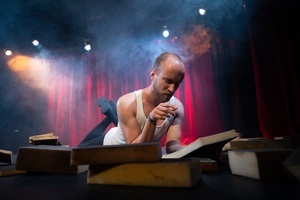In the organizer's words:
Time and space emerge from a deep E flat major chord, and a world of gods, dwarves, giants and natural creatures unfolds on the waves of the Rhine. But the paradisiacal original state does not last long: after the Nibelung Alberich is spurned by the Rhinemaidens, he decides to renounce love forever and seize the gold from the depths of the Rhine. He uses it to forge a ring that will give him world power. But Wotan, the father of the gods, also wants to possess the ring. With the help of the fire god Loge, he actually succeeds in stealing the ring from Alberich. But Alberich curses the ring: misfortune is to befall its owner - a prophecy that will soon be fulfilled for the first and not the last time. With DER RING DES NIBELUNGEN, Richard Wagner created a parable about the origin and end of the world and realized his radical idea of a Gesamtkunstwerk in which text, music and stage action form a symbiosis. Wagner's infinite melody and his leitmotif technique, which he had already developed in THE FLYING HOLLANDERS and LOHENGRIN, achieve a hitherto unimagined complexity in the RING. The creation of the RING tetralogy also solidified Wagner's plans for his own festival theater as a performance venue. However, at the request of his patron King Ludwig II, the premiere of RHEINGOLD took place at the Munich National Theater on September 22, 1869. The audience, which was largely made up of experts and art connoisseurs who had traveled from far and wide, gave the work rapturous applause. Wagner's vision of performing the entire RING OF THE NIBELUNG in his own festival theater finally became reality in Bayreuth in 1876. Director Paul-Georg Dittrich, who has already introduced himself in Cologne with his production of DER ZWERG, will stage a new RING. In RHEINGOLD, he embarks on a search for the childlike origins of the world. What happens when the free, unencumbered imagination is instrumentalized in a society obsessed with power? The musical director is the internationally sought-after conductor Marc Albrecht, who returns to the podium of the Gürzenich Orchestra after DIE FRAU OHNE SCHATTEN.
This content has been machine translated.













